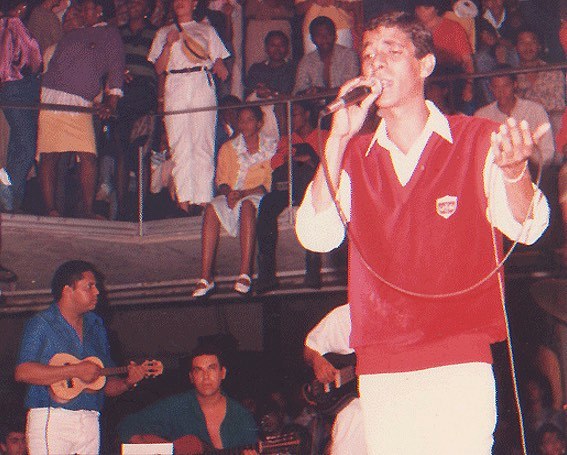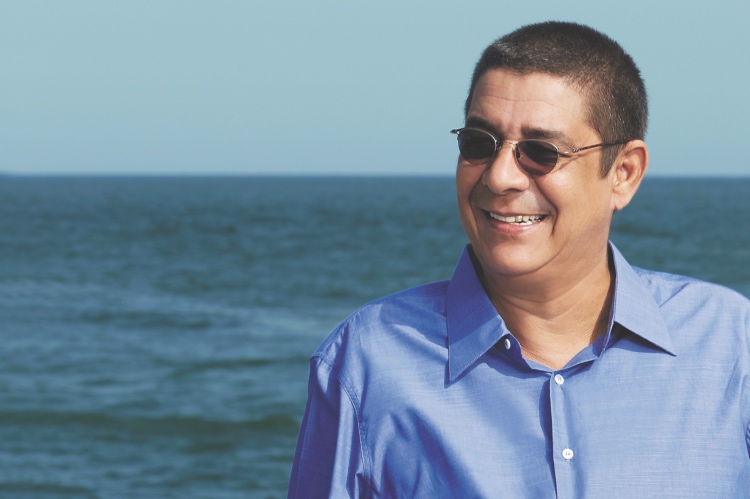‘From that moment,” says Zeca. “I have never more had a pause, I never more had peace in my life.”
His own samba Camarão que dorme a onda leva on that álbum became a huge success. Years later, Zeca’s individual album called ‘Zeca Pagodinho’, sold more than one million copies, the biggest selling Samba album in history. From then on, his name was written in the history of Samba in Brazil.
Modest and philosophical, Zeca explains: “things change by themselves. It is the nature of life. I don't know how to explain the changes in my music and my life. I live for the music. I don't care about success, I don't care about things like how many copies were sold. I am not interested on those things. I just want to sing my Sambas. Nothing else.”
On a practical note, however, Zeca admits that certain factors helped; “my career changed a lot since I went to Universal Music in 1995. It was an upgrade in my career. I then start to work with Nei Lopes and Dudu Nobre. This was a big change for my music.”
Another major change came in 2002, Zeca points out, “when I recorded the samba ‘Deixa a vida me levar’, his career changed due to the great success of that song.
Indeed, for fans, this samba became a sort of declaration of Zeca Pagodinho’s way of life, a way that was attractive to so many; simple, charismatic, friendly and unfazed by the problems and challenges that life throws at you.
Our conversation moves into what motivates him to sing, to compose, to play music. Zeca begins by lamenting that he has not composed much recently, due to the stroke that affected his friend and fellow sambista Arlindo Cruz. “But now, knowing that Arlindo is getting better I will start composing again, God willing, because next year I am planning to record a new album and I need to prepare for it.”
“About motivation, or inspiration…well, that’s simple, you wake up in the morning with a song in your ears, and it takes possession of you. There is a samba by Silas de Oliveira ‘Meu Drama” which talks about the ‘senhora tentação vestida de obsessão’ (Lady temptation dressed as obsession). This is the perfect definition of what means to compose for me. Music comes to my head as if somebody was singing it to my ears. I usually say that all the songs I’ve composed, somebody blew them into my ears. They come from my heart, but it is like somebody inside talking to me. Sometimes I ask myself ‘how did I write that’? I was probably very drunk or madly in love. But what inspires me are my family, my children… this is what helps me.”
Well, Zeca Pagodinho is well known for all those characteristics; his religious faith (he is devoted to St George, patron of the city of Rio de Janeiro and celebrated by the Afro-Brazilian religions as the Orixá Ogum), his dedication to family and friends and his appreciation of a good beer.
Since 1986 Zeca Pagodinho has recorded 28 albums, uncountable sambas, whose success have earned him a position among the greatest singers and samba writers in Brazil. Of all those, I ask, which is his own favourite?
Laughing he answers: “My friend, this is like asking which your favorite child is! Each one has its special thing. But I think that the first album, the one that sold 1 million copies, it was a great album, and the one where I was discovered, and I discovered something new in myself.”
When I ask who were his masters were, his teachers in the art of samba, Zeca gives a more affirmative answer: “ a Velha Guarda da Portela... a Velha Guarda do Império”, which simply means the veterans from the communities where samba was born, the guardians of the old samba traditions in Rio de Janeiro. Personally, Zeca also mentions Elizete Cardoso, Beth Carvalho and Martinho da Vila and then adds: “There are many! You would need two pages of the magazine just to include all names, it would be like a litany in which I would pray for all those wonderful sambistas.”
About Martinho da Vila, who has sung also in London recently, Zeca says: “Martinho da Vila, for instance, is a great partner. I never dreamed I would meet Martinho. Today we are partners in music, friends. Life is crazy. As I said to you in the beginning, things take their own course, if you allow them to.”
For Brazilians, it is easy to locate Zeca Pagodinho’s music, his style and sambas, so I ask Zeca to define his music for a non-Brazilian audience, for says readers of LatinoLife who are not Brazilians. Avoiding an aesthetic or technical answer Zeca prefers to say that “My music is true samba. It is the samba that everybody loves to listen to, to sing, to dance. It is the samba de partido-alto that I do with many friends, fellow musicians I meet in my life. It is the real samba, with great batucada, great musicians.”
Samba de partido alto as well as samba pagode are variations of samba which give an important space for lyrical improvisation and story telling. The stanzas are intercalated with a refrain sung by the group taking part in the percussion or solely taking part in the ‘roda de samba’. Zeca Pagodinho stresses how important the communitarian practice of samba is to his music, a practice he grew out of and is behind his latest album, “Quintal do Samba”, in which he invited lots of famous singers to sing with him, accompanied by amazing percussionists, musicians, and people from the neighbourhood attending this gathering.

At this point of the conversation I mention to Zeca that recently a friend in London had said that when he is listening to Zeca’s in concert he imagines him as a sort of a member of a Brazilian ‘Buena Vista Social Club’. To which Zeca cries: “Caramba! I will arrive there! I will try.”
“My plans and expectations are to live a happy life. That God protects my voice always. I am already 59 years old, so I need to take good care of myself, of my voice. I need to rest my voice to keep singing well. I also hope God will keep me with a good mind, will give me straight to continue. Just this. Nothing else. Everything else is gift”
Our conversation is coming to the end and I ask him what we can expect from his concert in London: “A great batucada, full of samba. I will be singing sambas that were important in my career. From the first album I will sing “Judia de mim’, ‘casal sem vergonha’, among others. Of course I will sing ‘Deixe a Vida me levar’, ‘Camarão que dorme a onda levar’ and many other sambas.
Our conversation ends and Zeca says that he needs to rest his voice. Rest it, Zeca as we are waiting to hear many of your sambas, new and old.
Dr Vinicius Mariano de Carvalho is Senior Lecturer at Brazil Insitute, King’s College London















